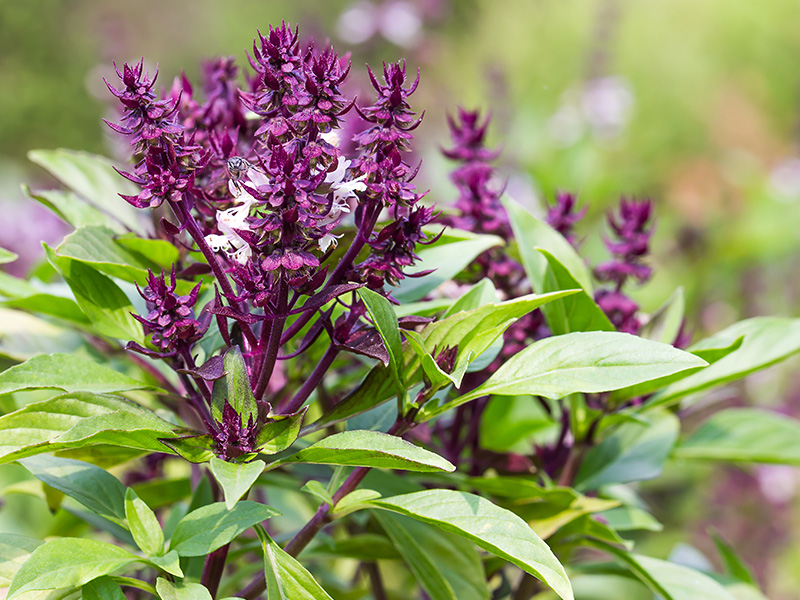Despite many wonders of science and industry, modern lifestyle is fraught with stress. Industrial revolution has burdened us with increasing exposure to unhealthy packaged and processed food. It has also led to preventable lifestyle related chronic disorders.
Ayurveda focuses on healthy lifestyle practices with the help of herbs and dietary and lifestyle changes. Of all the herbs used in Ayurveda, Holy Basil (Ocimum sanctum) is considered as one of the adaptogenic herbs.
In Ayurveda, Tulsi is known as “The Incomparable One”, “elixir of life”, “Mother Medicine of Nature” etc. It is known for both medicinal and spiritual purposes. It offers solutions to many modern- day health problems.

Medicinal Properties of Holy Basil:
- Rasa (Taste): Tikta (bitter) and Katu (pungent)
- Guna (Qualities): Laghu (light), Rooksha (dry) and teekshna (piercing)
- Undergoes pungent taste conversion after digestion
- Veerya (Potency): Ushna (Hot)
- Effect on Tridosha: Balances Vata and Kapha doshas and increases Pitta dosha.
- Part used: Leaf, Root, Flower and Stem
- Dosage: Root decoction – 50 – 100 ml, Fresh juice – 10-20 ml and Seed powder – 3-6 g
Holy Basil: Herb for Healthy Immune System:
In modern times, there is much awareness of diet and lifestyle changes. But, despite many healthy diets and hours spend at the gym, keeping oneself healthy at bay is more challenging than ever. But holy basil is an herb that is traditionally used for healthy immune system as well as an anti-stress agent. It is one of the Ayurvedic herbs that is used not only to improve not only the physically well- being but also the mental and emotional health.
Ayurveda looks at immunity through a concept known as ‘Beej Bhoomi’. ‘Beej’ means seed and ‘Bhoomi’ means earth. Unless the earth is fertile, it cannot take root. So, ensuring the body is in a state of achieving immune strength is the goal of Ayurveda.
Strong immunity improves the quality of life and holy basil is one of the best herbs that act as immunity booster.
For boosting immunity, tulsi tea can is the best option to be included in daily diet. Tulsi tea is rich in antioxidants and natural phytochemicals which are water-soluble. This tea supports immune system, respiratory system, nervous system etc.
- It has anti-microbial and immunomodulatory properties which help in preventing common cold, flu, recurrent infections, productive cough, bronchitis etc.
- According to Ayurveda, immunity is directly linked to Agni (digestive fire).
- Holy basil also helps in improving appetite, digestion and overall metabolism of the body.
- It also has calming and stress relieving effect on the brain.
- Holy basil helps in expelling out the phlegm from throat due to its immunomodulatory, expectorant and anti-inflammatory properties.
- This plant also contains phytochemicals such as Eugenol, Camphene etc. that help in relieving congestion.
How to prepare Holy Basil tea:
Ingredients:
- Tulsi leaves (chopped): 2 tablespoons (5 grams)
- Water: one and a half cup
How to prepare:
- Take water in a pan and add 2 tablespoons of chopped tulsi leaves.
- Boil the water for 5-10 minutes.
- Strain and serve it hot.
This tea is full of antifungal, anti-inflammatory, anti-microbial properties that help the body in fighting with allergies and infections of the respiratory tract.
Contraindications:
- Holy Basil is not recommended for pregnant and nursing women.
- It is also best avoided in low blood sugar.
- It is not normally recommended when there is a health situation involving high Pitta because it is warming in nature. So, it is best to combine it with some cooling herbs such as brahmi, gotukola, hibiscus etc.
- Tulsi with milk is not ideal because tulsi being hot and milk being coolant, this combination can cause skin disorders.
Mercury Controversy:
There is a rumor attached to holy basil that its leaves should not be chewed but from an Ayurvedic perspective, this argument does not support any ground. In Sharangdhara Samhita (Ayurvedic text), it has been explained that 6-12 ml of holy basil juice should be given with 1-3 gm of black pepper powder for recurrent fever. So, if tulsi leaves can be crushed to prepare juice, then why the leaves can’t be chewed and consumed?
Some Ayurvedic formulations containing Holy Basil as in ingredient:
- Tribhuvan Kirti Ras
- Mukta Panchamrit Ras
- Vilwadi Gulika
- Muktadi Mahanjan
Disclaimer:-
This article is not a substitute to the standard Medical Diagnosis or personalized Ayurvedic Treatment! It is intended only for Information!
For experts consultation, please write us at care@blessayurveda.com
4,169 total views, 4 views today